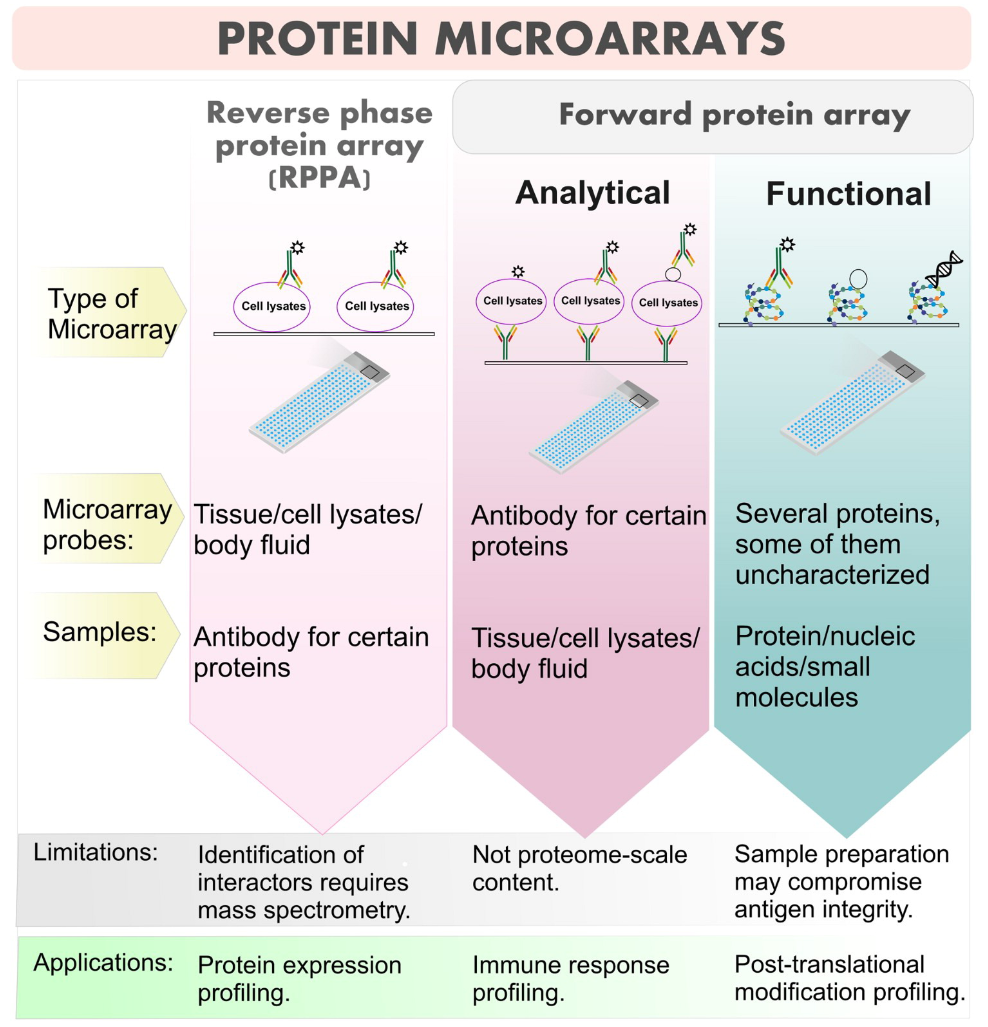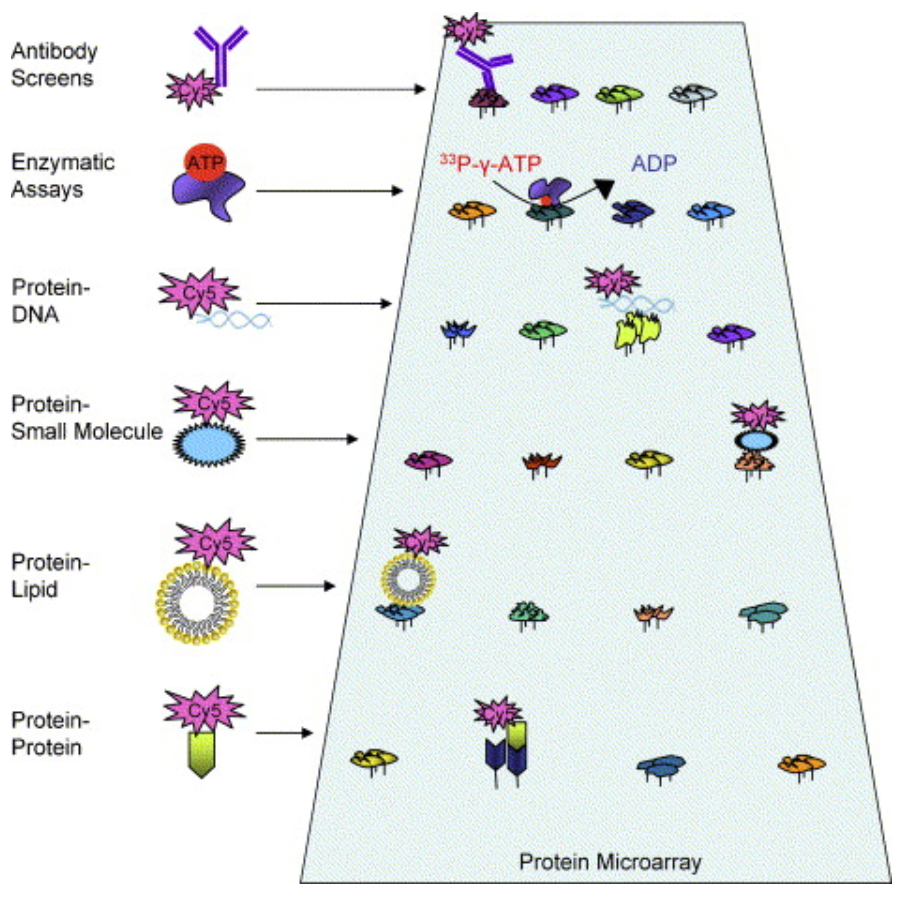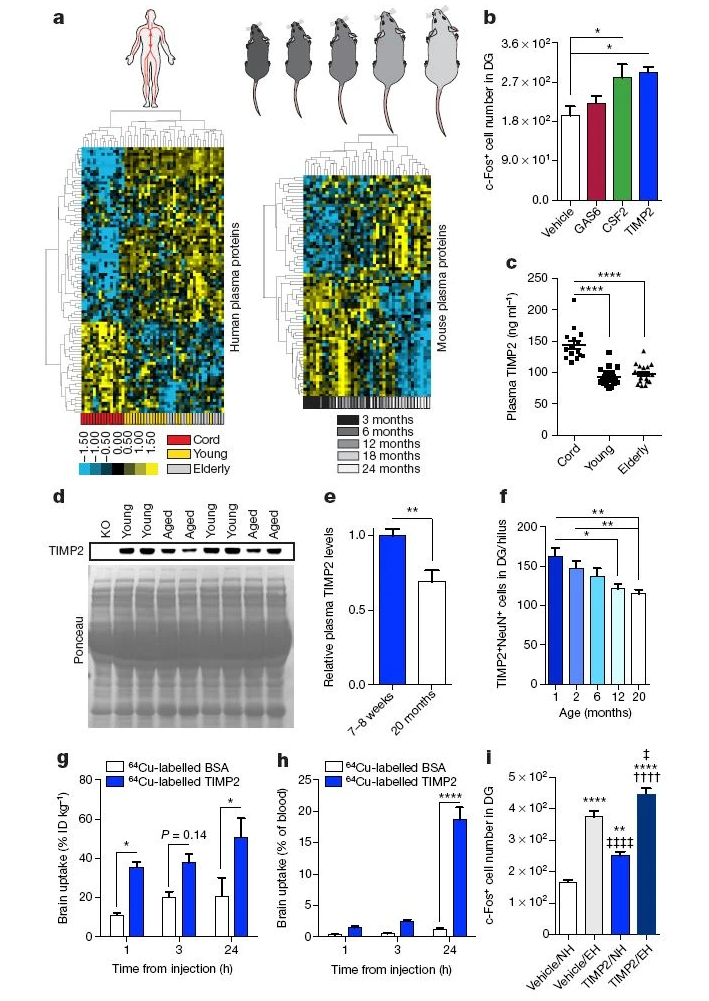Protein Microarray Analysis Service
- Reverse Phase Protein Arrays (RPPA), which immobilize various lysate samples on the same chip to analyze protein expression;
- Analytical Protein Arrays, which are predominantly antibody arrays designed for protein detection using direct labeling or sandwich assay formats;
- Functional Protein Arrays, which enable the study of diverse protein interactions, including protein binding and enzyme-substrate reactions.
Protein microarray analysis is an advanced high-throughput technology designed to investigate protein functions, modifications, interactions, and networks on a large scale. Protein microarrays are broadly classified into three main types:

Figure 1. Major Types of Protein Microarrays
Protein microarray analysis enables the efficient detection and quantification of various molecular interactions, including protein-protein, protein-DNA, antigen-antibody, receptor-ligand, and enzyme-substrate interactions, by incubating microarrays containing immobilized proteins or protein-interacting molecules (such as antibodies, peptides, or ligands) on a solid surface with labeled analytes.

Figure 2. Applications of Protein Microarrays
The importance of protein microarray analysis lies in its ability to address critical challenges in protein research. It provides an efficient platform to uncover complex protein interaction networks, identify low-abundance proteins, and study post-translational modifications (PTMs), all of which are essential for understanding cellular processes and disease mechanisms. Furthermore, it has transformative applications in biomarker discovery, drug target identification, and disease diagnostics, making it a cornerstone for both basic and applied biomedical research.
Services at MtoZ Biolabs
To meet the growing demand for advanced proteomic studies, MtoZ Biolabs offers a Protein Microarray Analysis Service that combines cutting-edge microarray technology with expert data interpretation. Our Protein Microarray Analysis Service provides comprehensive solutions, including experimental design, high-throughput protein interaction screening, and customized data analysis. Our capabilities extend to functional arrays, reverse-phase arrays, and antibody arrays, allowing tailored approaches for diverse research needs. By integrating protein microarray data with complementary techniques like mass spectrometry, we ensure robust and reliable results to support your scientific objectives.
Whether you aim to identify novel biomarkers, screen therapeutic targets, or study protein-protein interactions, our Protein Microarray Analysis Service is designed to accelerate your research and provide unparalleled insights into protein function. If you are interested in our Protein Microarray Analysis Service, please feel free to contact us.
Why Choose MtoZ Biolabs?
1. Advanced Analysis Platform: MtoZ Biolabs established an advanced Protein Microarray Analysis Service platform, guaranteeing reliable, fast, and highly accurate analysis service.
2. High-Throughput and Scalable Analysis: Protein microarray analysis technology enables the simultaneous detection and quantification of thousands of molecular interactions, offering unmatched scalability for large-scale proteomic studies.
3. Complementary Validation Options: Integration with mass spectrometry and other proteomic techniques ensures robust data validation, enhancing the reliability and reproducibility of the results.
4. One-Time-Charge: Our pricing is transparent, no hidden fees or additional costs.
5. High-Data-Quality: Deep data coverage with strict data quality control. AI-powered bioinformatics platform integrates all protein microarray analysis data, providing clients with a comprehensive data report.
Applications
Protein microarray analysis is a powerful tool in various sectors:
1. Protein Interactions Analysis
Study protein interactions with proteins, peptides, nucleic acids, small molecules, and glycans.
2. Antibody Specificity Profiling
Analyze monoclonal antibody specificity for precise immunological studies and therapeutic applications.
3. Post-Translational Modification (PTM) Analysis
Detect and study modifications such as phosphorylation, ubiquitylation, and acetylation.
4. Host-Microbe Interaction Research
Investigate molecular interactions between host proteins and microbial components.
5. Biomarker Identification
Discover and validate biomarkers for disease diagnostics and therapeutic monitoring.
Case Study
Using Protein Microarray Analysis to Identify Pro-Plasticity Factors in Ageing-Related Cognitive Decline
Protein microarray analysis has enabled groundbreaking discoveries in the study of aging-related cognitive decline. Using this advanced technology, researchers identified Tissue Inhibitor of Metalloproteinases 2 (TIMP2) as a critical pro-plasticity factor. By analyzing plasma proteins from human umbilical cord blood, young adults, and elderly individuals, as well as mice of various ages, significant age-related protein changes were revealed through unsupervised hierarchical clustering and significance analysis of microarrays (SAM). TIMP2 was enriched in cord and young plasma and decreased with aging. Functional validation demonstrated that systemic administration of TIMP2 enhanced synaptic plasticity and hippocampal-dependent cognition in aged mice, as shown by increased c-Fos-positive cells in the dentate gyrus. Additionally, TIMP2 uptake in the brain confirmed its direct role in cognitive enhancement. This study highlights the power of protein microarray analysis in identifying therapeutic targets, offering promising avenues for addressing age-related neurodegenerative disorders.

Figure 3. Protein Microarray Analysis Identifies Putative Pro-Plasticity Factors
Deliverables
1. Comprehensive Experimental Details
2. Materials, Instruments, and Methods
3. Total Ion Chromatogram & Quality Control Assessment (project-dependent)
4. Data Analysis, Preprocessing, and Estimation (project-dependent)
5. Bioinformatics Analysis
6. Raw Data Files
MtoZ Biolabs, an integrated chromatography and mass spectrometry (MS) services provider.
Related Services
Protein-Protein Interaction Analysis Service
How to order?







